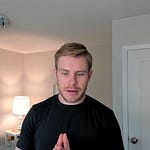Read time: 12 minutes
Good morning, 66.1ers.
Welcome to issue #122 of 66.1.
The boring stuff
Full access to this post and podcast is reserved for paid members of 66.1.
Free subscribers: if you want to hear my thoughts on:
Why most people think about sleep wrong (and how to think differently)
The 4 levers of restorative sleep
A 7-day sleep revolution challenge
Get access to today’s post and all 121 past issues of 66.1 by upgrading your subscription at the button below.
Paid Subscribers: thanks for your support. Your contribution allows us to continue developing 66.1 into your #1 longevity resource.
Today’s issue brought to you by Freedom Fats (America’s #1 cooking fat).
Freedom Fats is a company I co-founded with my friend Rob to make sure you have access to healthy, tasty cooking fats.
We’re shipping our first batch of grass-fed beef tallow to customers in Colorado, Montana, Illinois, California, Minnesota, and Wisconsin this week! If that’s you—thanks for you support.
Setting the scene
"Sleep is the best meditation." — Dalai Lama
Life is better when you sleep. Your mind is clearer, your body stronger, challenges more manageable. And this is why everyone says sleep is a superpower.
But I’ve been thinking lately that it might be the other way around: when life is better, you sleep.
I’ve been sleeping noticeably better lately, and this improvement got me thinking about what changed. And the answer has nothing to do with my mattress, blackout curtains, my blue light exposure, or any of the numerous factors we’ve been told need to be woven together into the perfect bedtime routine.
This past few weeks of improved sleep and subsequent data analysis has led me to a new framework that I think could help many of you out there who struggle to get high quality sleep.
I had initially planned to outline a sleep hygiene routine in this week’s newsletter, but I think that information is best saved for a future issue. For now, let’s get the big things right so that our optimization efforts actually make a difference.
Sleep: Your Body's Health Report Card
If you’re like most people, you probably think about sleep as factor that contributes to your health. Get good sleep, be healthier. You view it as a lever you can pull to improve your health, similar to diet, exercise, healthy relationships, and your environment.
But I've come to see it differently. Sleep isn't just a contributing factor to health – it's more accurately described as a measuring stick or gauge for how healthy you are.
How many people do you know who have shelled out thousands of dollars for the perfect mattress, blackout shades, cooling mattress pad, sleep apnea machine, and a dozen different pillows? I know a few. And most continue to struggle with the challenge. While I admire their commitment to the cause, I’m afraid they’re too far downstream to improve the problem.
Having worked with dozens of clients who struggle with sleep quality, plus tinkering with my own routine and diligently collecting data, I’ve come to believe that folks who struggle with chronic poor sleep quality are deficient in one of the four levers below.
Put another way, your sleep is essentially giving you a nightly report card on your overall wellness.
The Four Levers of Restorative Sleep
Through both personal experience and working with countless clients, I've identified four fundamental "levers" that dramatically impact how well we rest. I call them levers because they're adjustable factors under our control that, when properly "pulled," create the conditions for naturally restorative sleep.
1. Get Moving (Daily)
With spring arriving, I've naturally increased my walking and running because I’m more excited to spend time outside. This change corresponds directly with improvements in my sleep quality.
Research shows: Multiple studies demonstrate that exercise significantly improves sleep quality. A systematic review and meta-analysis found that exercise interventions produced significant improvement in sleep quality as measured by the Pittsburgh Sleep Quality Index (PSQI), with regular physical activity reducing sleep disturbances regardless of exercise type or intensity (1). Another study found that moderate physical activity was more effective than vigorous activity for improving overall sleep quality (2).
The connection makes evolutionary sense (as does all the best science): we evolved to expend energy during daylight hours and recover during sleep. Without this regular energy expenditure, the body has less need for deep recovery sleep, potentially contributing to restlessness and inconsistent sleep patterns.
2. Get your sunlight 😎
Again, advice aligned with evolution: more time outside leads to better sleep. As I've spent more time outside this spring, I've noticed improvements in both sleep duration and depth.
Research shows: Morning sunlight exposure has been found to significantly impact your circadian rhythms and sleep quality. Light is considered the major stimulus that helps your body understand when to do certain activities like sleeping and waking (3). Getting outside for just 5-10 minutes on sunny mornings helps regulate your "circadian clock" — the body's mechanism for anticipating when to wake up and go to sleep (4). For people on a regular schedule, bright morning light causes a phase advance, meaning you'll get sleepy earlier in the evening and wake up earlier in the morning (5).
When natural light hits your retinas in the morning, it helps calibrate your circadian rhythm—the internal clock that governs sleep timing. This morning light exposure essentially sets the timer for when your body will naturally produce melatonin in the evening, typically about 14-16 hours later.
I don’t have science for it, but I’m convinced that there’s a dose-response relationship at play here, too: I’ve yet to sleep poorly after an entire day spent outdoors. Just 20 minutes to game your circadian rhythm, though, and you’re not going to see the same effect.
3. What (and When) You Eat Matters ⏲ 🥑🍖
Both the content of your diet and the timing of your meals significantly impact sleep. I've observed in myself that certain dietary choices consistently disrupt my sleep—particularly high volumes of greasy food and alcohol (especially wine). Cookies and other baked goods with baking soda or baking powder are a problem, too. I wake up to weird dreams with alcohol and acid reflux with the wrong foods.
Research shows: Studies have found that diet composition significantly impacts sleep quality, with diets high in carbohydrates positively affecting sleep timing and diets high in protein resulting in less wakefulness during the night (6). Additionally, poor nutrition has been found to contribute to insomnia, with unhealthy eating potentially leading to obesity, which increases risk of developing obstructive sleep apnea (7). The timing of eating also affects circadian rhythms, so an irregular eating schedule may worsen sleep disorders (6).
Equally important is meal timing. Late dinners that have you going straight from dinner to bed compromise sleep quality. Think bloating, acid reflux, and frequent waking. No bueno.
My personal experience: When I eat dinner at least 3 hours before bedtime, I sleep more deeply and wake up less frequently overnight.
Have you ever returned from a trip with unexpected insights that changed how you approach your day-to-day life? Reply to this email—I'd love to hear your story. I reply to every email I receive.
4. Good people are the secret sauce
Perhaps most surprising in my recent observations has been the strong correlation between social connections and sleep quality. When I maintain regular, meaningful contact with friends and family I care about, my sleep noticeably improves.
Research shows: The quality of social relationships and social support appears to be strongly associated with sleep quality. Studies show that supportive social ties are positively related to sleep quality, while aversive ties predict worse sleep quality, with depression mediating these connections (8). Research has also found that older adults with strong social support from spouses, family, and friends were more likely to experience better sleep quality compared to those with weak social support (7).
This connection makes sense evolutionarily. Our nervous systems evolved in social contexts and function optimally when we feel securely connected to others. Positive social interactions help regulate stress responses, provide emotional security, and activate parasympathetic nervous system functions that facilitate relaxation and ultimately sleep.
Imagine your ancestors: if you were alone out on the savannah with lions, sleep was the equivalent of asking to be eaten. If you were well surrounded by your tribe, sleep was a luxury you could afford. Lions are few and far between, but your brain is still wired that way.
Why Your Sleep Hygiene Isn't Working
Listen to this episode with a 7-day free trial
Subscribe to 66.1 to listen to this post and get 7 days of free access to the full post archives.

















